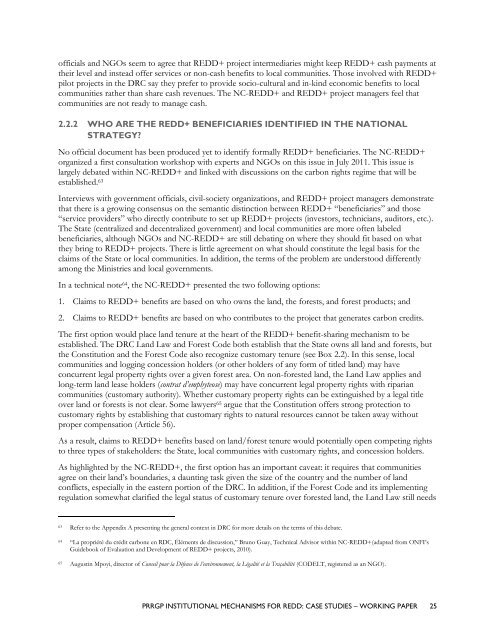Institutional Mechanisms for REDD+ - Case Studies Working Paper
Institutional Mechanisms for REDD+ - Case Studies Working Paper
Institutional Mechanisms for REDD+ - Case Studies Working Paper
You also want an ePaper? Increase the reach of your titles
YUMPU automatically turns print PDFs into web optimized ePapers that Google loves.
officials and NGOs seem to agree that <strong>REDD+</strong> project intermediaries might keep <strong>REDD+</strong> cash payments at<br />
their level and instead offer services or non-cash benefits to local communities. Those involved with <strong>REDD+</strong><br />
pilot projects in the DRC say they prefer to provide socio-cultural and in-kind economic benefits to local<br />
communities rather than share cash revenues. The NC-<strong>REDD+</strong> and <strong>REDD+</strong> project managers feel that<br />
communities are not ready to manage cash.<br />
2.2.2 WHO ARE THE <strong>REDD+</strong> BENEFICIARIES IDENTIFIED IN THE NATIONAL<br />
STRATEGY?<br />
No official document has been produced yet to identify <strong>for</strong>mally <strong>REDD+</strong> beneficiaries. The NC-<strong>REDD+</strong><br />
organized a first consultation workshop with experts and NGOs on this issue in July 2011. This issue is<br />
largely debated within NC-<strong>REDD+</strong> and linked with discussions on the carbon rights regime that will be<br />
established. 63<br />
Interviews with government officials, civil-society organizations, and <strong>REDD+</strong> project managers demonstrate<br />
that there is a growing consensus on the semantic distinction between <strong>REDD+</strong> ―beneficiaries‖ and those<br />
―service providers‖ who directly contribute to set up <strong>REDD+</strong> projects (investors, technicians, auditors, etc.).<br />
The State (centralized and decentralized government) and local communities are more often labeled<br />
beneficiaries, although NGOs and NC-<strong>REDD+</strong> are still debating on where they should fit based on what<br />
they bring to <strong>REDD+</strong> projects. There is little agreement on what should constitute the legal basis <strong>for</strong> the<br />
claims of the State or local communities. In addition, the terms of the problem are understood differently<br />
among the Ministries and local governments.<br />
In a technical note 64, the NC-<strong>REDD+</strong> presented the two following options:<br />
1. Claims to <strong>REDD+</strong> benefits are based on who owns the land, the <strong>for</strong>ests, and <strong>for</strong>est products; and<br />
2. Claims to <strong>REDD+</strong> benefits are based on who contributes to the project that generates carbon credits.<br />
The first option would place land tenure at the heart of the <strong>REDD+</strong> benefit-sharing mechanism to be<br />
established. The DRC Land Law and Forest Code both establish that the State owns all land and <strong>for</strong>ests, but<br />
the Constitution and the Forest Code also recognize customary tenure (see Box 2.2). In this sense, local<br />
communities and logging concession holders (or other holders of any <strong>for</strong>m of titled land) may have<br />
concurrent legal property rights over a given <strong>for</strong>est area. On non-<strong>for</strong>ested land, the Land Law applies and<br />
long-term land lease holders (contrat d’emphyteose) may have concurrent legal property rights with riparian<br />
communities (customary authority). Whether customary property rights can be extinguished by a legal title<br />
over land or <strong>for</strong>ests is not clear. Some lawyers 65 argue that the Constitution offers strong protection to<br />
customary rights by establishing that customary rights to natural resources cannot be taken away without<br />
proper compensation (Article 56).<br />
As a result, claims to <strong>REDD+</strong> benefits based on land/<strong>for</strong>est tenure would potentially open competing rights<br />
to three types of stakeholders: the State, local communities with customary rights, and concession holders.<br />
As highlighted by the NC-<strong>REDD+</strong>, the first option has an important caveat: it requires that communities<br />
agree on their land‘s boundaries, a daunting task given the size of the country and the number of land<br />
conflicts, especially in the eastern portion of the DRC. In addition, if the Forest Code and its implementing<br />
regulation somewhat clarified the legal status of customary tenure over <strong>for</strong>ested land, the Land Law still needs<br />
63 Refer to the Appendix A presenting the general context in DRC <strong>for</strong> more details on the terms of this debate.<br />
64 ―La propriété du crédit carbone en RDC, Éléments de discussion,‖ Bruno Guay, Technical Advisor within NC-<strong>REDD+</strong>(adapted from ONFI‘s<br />
Guidebook of Evaluation and Development of <strong>REDD+</strong> projects, 2010).<br />
65 Augustin Mpoyi, director of Conseil pour la Défense de l’environnement, la Légalité et la Traçabilité (CODELT, registered as an NGO).<br />
PRRGP INSTITUTIONAL MECHANISMS FOR REDD: CASE STUDIES – WORKING PAPER 25

















